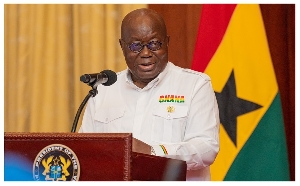Opinions of Wednesday, 27 April 2011
Columnist: GNA
Bridging our digital gap - The Glo Equation
A GNA feature by Christian Akorlie
Accra, April 26, GNA - The recent unveiling of the services of GLO 1, Globacom's submarine fibre optic cable in Ghana, has suddenly opened the door to limitless possibilities.
The opportunities opened for the country is in the field of telecommunications, business, agriculture, education and internet services which should help speed up Ghana's development process. Like many countries around the world, Ghana has already demonstrated a strong capacity for growth in the ICT subsector 96 notably so in the area of mobile communication.
The number of mobile cellular subscriptions in Ghana surpassed 17 million at the end of 2010, having grown almost ten-fold from 1.7 million just five years earlier.
Unfortunately, however, the rate of internet penetration is still low albeit on the increase.
Internet usage which had been rather too sluggish and, at the beginning of the decade, was largely dependent on dial-up modems also increased from 2.3 million in 2008 to about 4.2 million in 2010 - representing some 18 per cent the country's population.
Clearly, it will be of strategic importance for Ghana to set for herself the goal of achieving the same miracle for Internet access as she has achieved for mobile usage and tele-density in general. It comes as very little surprise therefore that the Government, the National Communications Authority and all key stakeholders in the ICT sub-sector see in the GLO 1 initiative, a huge transforming impact, not just on the communication industry but also on the lives of ordinary citizens.
"The launch of Glo 1 is West Africa's indigenous response to the need for global connectivity and this is the first time that we are having such a major investment coming from an African, meant for an African, and connecting with the rest of the world," Communications Minister Haruna Iddrisu, told guests at the launch.
The Glo-1 cable system would provide bandwidth to telecom operators, carriers and corporate businesses, connecting them through its undersea network and global partnerships to all the major destinations in the world and offering them a choice of wide range of highly reliable, secure and cost effective bandwidth service. One significant value which Glo-1 will introduce onto the market is the benefits of professional account management which comes with consumers having to deal with a single point of contact - a consultative approach to customised solutions that suit the customer's requirement. Notably, Glo-1's sheer massive capacity allows for augmenting or upgrading at a very short notice.
Stakeholders believe that the 640 Gigabytes bandwidth capacity that GLO 1 adds to the country's broadband infrastructure will go a long way to support the implementation of an ICT-led socio-economic development policy, and e-strategy plan of the Government to help establish Ghana as the ICT hub within the West Africa sub-region.
The uptake of broadband in Ghana stands at one per cent, extremely low and inadequate for meaningful development. But with the arrival of Glo 1 and other submarine cables, the total bandwidth capacity of 2,040 gigabytes will be available to Ghana.
With that capacity, Ghana clearly beats the International Telecommunications Union (ITU) indication penetration level for developing countries, which currently stands at four per cent (as against 23 per cent for the developed world).
Analysts are particularly excited about a phenomenal, but steady easing of the high cost of access to broadband which has been on a downward slide in recent times, falling from a 131 per cent of average monthly income in 2008 to 80 per cent of monthly income in 2009. The GLO1 cable is even expected to lower the cost further.
The general expectation is that the increase in bandwidth capacity will be more than adequate to meet the increasing demand for communication services, promote and support business process outsourcing industry in Ghana by creating jobs and revenues to government while exerting a downward pressure on prices as a result of increased competition.
The government says, it considers the ICT sector as a platform for accelerating and promoting a transparent and accountable government system, a strong and resilient economy to enhance the creation of jobs as well as knowledge-based economy.
Vice President John Mahama said at the launch of Glo-1 recently: "Through the development and the modernisation of our ICT infrastructure, we would be able to improve our financial and commercial services; improve health delivery; expand and extend the education system; modernise agriculture to add value; and also promote ICT to business and empower our citizens."
The same expectation and sentiments are shared by Globacom's Group Chief Operating Officer, Mohammed Jameel, who believes that Glo 1 can trigger an unmatched socio-economic revolution in several economic sectors in Ghana, including telecom, agricultural, transportation and tourism.
"With the amazing broadband capacity which the Glo 1 submarine cable is offering, Ghanaians and the rest of Africa have the limitless potential to be connected to a new era of prosperity where bulk of data that can be used to transform lives and climb the social and economic ladder can be downloaded and uploaded at the speed of light," he said .
"With the cable, farmers in the different regions of Ghana would be able to access high yield seeds from any part of the world and similarly students and educationists could tap into Glo 1 facility for long distance learning, research and any other academic pursuit," he added.
Deputy Secretary-General of ITU, Houlin Zhao, said the cable would improve connectivity, reduce communication cost and enable new and valuable services in Ghana and the rest of the sub-region. These will include distance learning and the creation of virtual private networks.
It would also enable a whole host of new and valuable services in Ghana and across the West African Sub-region, including telemedicine, distance learning, video-conferencing and the creation of virtual private networks. In addition, it would create foreign investment and employment opportunities.
The stakeholder expectation is that GLO 1 will provide a cost-effective voice, data, video and e-commerce services across Africa, Europe and the rest of the world besides carrying traffic for other operators that would lease the service.
For instance, it would be easier and cost effective for a businessman in Ghana to have a video conference with his principals or partners elsewhere in the world, instead of travelling to the meeting. In the field of medicine, there is easy access to world renowned doctors that can carry out diagnosis on-line and video-conferencing during surgery and research.
With the increasing number of students joggling for places and space at the country's university campuses, a broadband facility such as GLO 1 promises to ease the intense pressure on our institutions of higher learning and create a more conducive ambience for E- Learning. Distance learning is made easy and more interactive by bringing lecturers or instructors and classes of students from different parts of the world together in real time.
It would also help improve service delivery in the public sector, cutting down on government bureaucracy through increased opportunities for on-line executions for business and transactions with the public agencies and service such as insurance, issuance of licences and other government business.
In the entertainment industry, Glo 1 brings high quality pictures and imaging as well as voice clearance.
In the telecommunication sector, it brings with it high speed and reliable data, voice and video connectivity, high speed internet, games and other online entertainment.
With the growing number of customers, banks can also avail themselves of the opportunities offered by GLO 1 to expand the delivery channel of their electronic banking offerings. Customers will no longer have to enter a banking hall to carry out their transactions. They may check their account, receive and send money anywhere, anytime.
There is also the possibility of effective and efficient call centres across the nation as well as on time and effective communication and disaster management.
GLO 1 will also offer government agencies and companies the opportunity to set up disaster recovery centres that would enable them to back up their valuable documents and to easily recover them in cases such as fire outbreaks.
With GLO 1 on board, it is now possible to speed up government's plan to extend internet facilities to all health institutions to meet the Millennium Development Goals and also promote e-health. In addition, the Government's focus on developing terrestrial fibre broadband infrastructure to cover all Metropolitan, Municipal and District Assembly areas, under the e-Government infrastructure can now be realised with little or no worries about the technical capacity to support such a massive programme.












